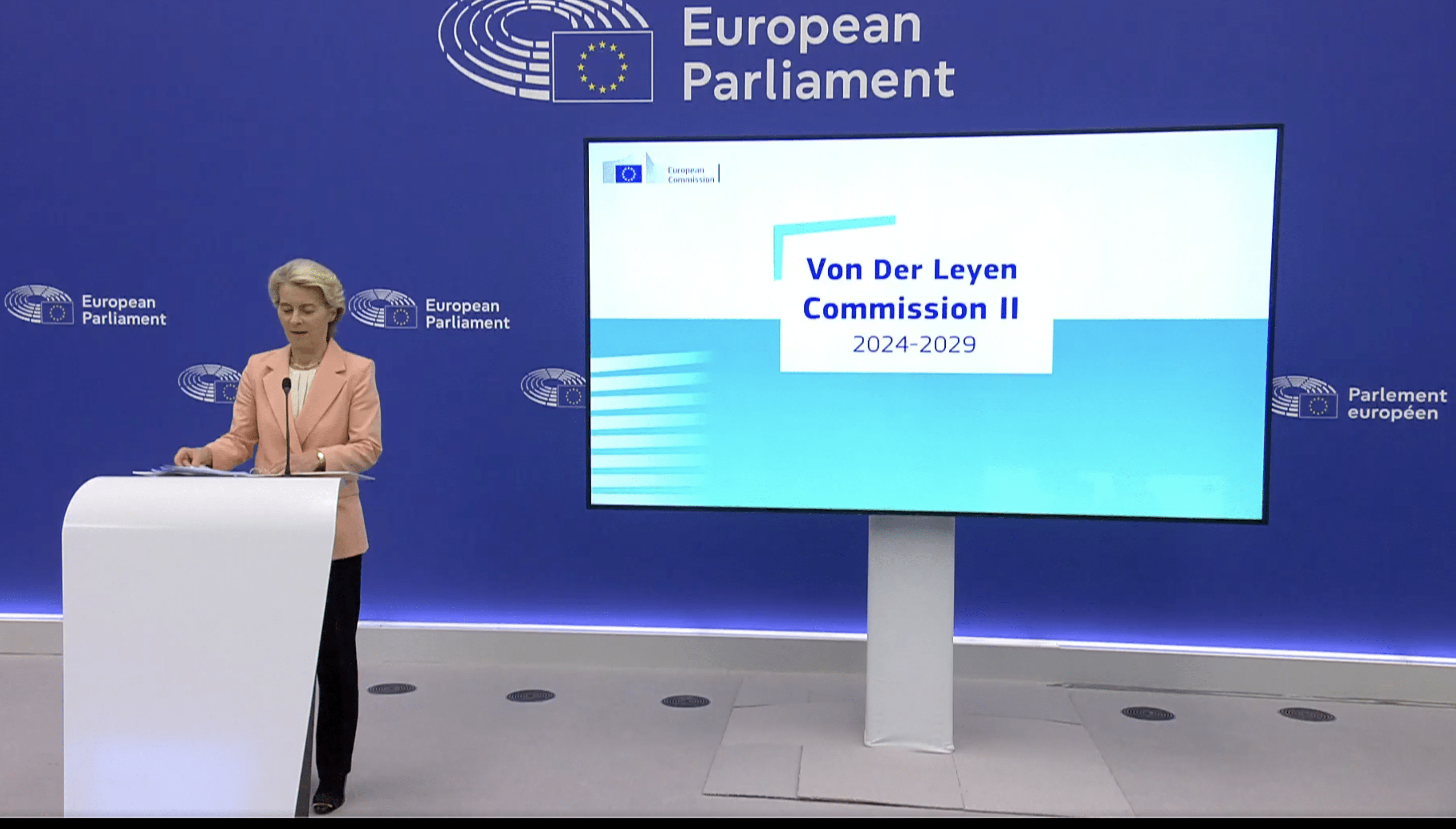Luxembourg’s Finance Minister: “I do not Believe that Fortress Europe is a Viable Option”
On September 19, mister Roth gave a lecture to Bocconi students titled “Europe at the Crossroads: Turning Today’s Poly-Crisis Into Tomorrow’s Poly-Opportunity”. Eleanor Spaventa, a professor of European Law at Bocconi and a member of the IEP@BU managing board, chaired the event co-hosted by IEP@BU and the Department of Legal Studies.

“The EU must also continue to adhere to trade openness, not only to ensure access to critical resources, but also to accelerate innovation and technological progress, and allow its citizens and businesses to access best-class services, irrespective of where they are located”. Gilles Roth is Luxembourg's Finance minister, he has a thirty-year experience in policymaking positions both in his home country and at the European level.
On September 19, mister Roth gave a lecture to Bocconi students titled “Europe at the Crossroads: Turning Today’s Poly-Crisis Into Tomorrow’s Poly-Opportunity”. Eleanor Spaventa, a professor of European Law at Bocconi and a member of the IEP@BU managing board, chaired the event co-hosted by IEP@BU and the Department of Legal Studies.
In the following interview, mister Roth has also agreed to share his views on the current challenges that the EU faces, and the policy recommendations included in the recently released Mario Draghi’s report on the Future of European Competitiveness. He shares many of the diagnoses of the report, but not all the policy recommendations.
Minister Roth, Mario Draghi has recently presented his long-awaited report on the Future of European competitiveness. The document includes many policy recommendations. Is there anything you particularly agree or disagree with?
The recently published Draghi report gives us an overview of the main challenges the European Union is currently facing, and I agree on the three main levers identified in the report to reignite sustainable growth: it will be key for the EU to refocus its efforts to close the innovation gap with other jurisdictions.
Developing a joint plan for decarbonisation and competitiveness of our economies, as well as reviewing the toolbox to increase our security and reduce undue dependencies are areas where we need to act.
To allow the EU to grow and prosper going forward, we will need to define the concrete policy actions that are necessary to deliver the best on these objectives.
Being able to create a business-enabling framework for financial services will play a key role in that regard, as it will help to channel the necessary investments to those areas where we need them most.
As pointed out in the Draghi report, we need to overcome the current situation of underdeveloped EU capital markets, and an EU economy is too reliant on bank financing. The EU must notably take leadership in innovation, including financial innovation, develop its venture capital markets, review national insolvency frameworks, and make European stock markets more attractive for IPOs. The Draghi report includes welcome policy recommendations in that regard.
Regulation should serve as a catalyst to such initiatives, and not hamper them. Streamlining the regulatory environment is essential to allow businesses to thrive and to strengthen the EU's position in the global economy.
The EU must also continue to adhere to trade openness, not only to ensure access to critical resources, but also to accelerate innovation and technological progress, and allow its citizens and businesses to access best-class services, irrespective of where they are located. I am deeply convinced that a fortress Europe is not a viable option.
Other policy recommendations of the Draghi report are more controversial.
Luxembourg does not share the diagnosis that centralized supervision of European capital markets - by the European Securities and Markets Authority – should be the way forward. With their extensive expertise and knowledge of national specificities and needs, national competent authorities are indeed best placed to maintain their current role.
As regards the policy recommendations on the Banking Union, creating a separate jurisdiction for European banks with substantial cross-border operations along the lines outlined in the report will not help overcome the concerns outlined by many Member States over the past years.
The Eurogroup has agreed – in June 2022 and March 2024 - on the set of actions that are necessary to make progress, both on the Banking Union and Capital Markets Union. Adhering to the latter, and focusing future work on the identification of concrete obstacles before outlining solutions, will be instrumental to making progress and achieving tangible outcomes.
Draghi argues for an increase in European investment spending of unprecedented size, more than 800 billion euros a year. He does not enter into the details of how to fund this spending. What do you recommend?
It is clear that the EU faces major challenges, including competitiveness, demographic change, the dual transition, and defense capabilities. At the same time, we need to be realistic about our resources.
We will need to re-prioritize spending in the EU, to ensure that we take on these challenges in a sustainable manner. It is also clear that the public purse cannot stem the fiscal pressures alone.
We need to leverage private capital and attract international investment into the EU. Europe needs to remain attractive to investors from around the world. This includes creating a regulatory environment that allows businesses to thrive and strengthen the EU's position in the global economy.
Do you think that the Next Generation approach might be a blueprint for developing new ways of financing investments?
NextGenerationEU (NGEU) was agreed upon during a time of crisis. Rightly so. The large financial stimulus package continues to support the economic recovery of member states from the pandemic.
As such, the NGEU package – worth a total of 800 billion euros – is a temporary instrument that helps making our economies greener, more digital and more resilient. As you know, member states are currently in the process of implementing NGEU. During this process, we will learn more about what worked well and where there are areas of improvement. It is too early to draw conclusions just yet.
A few days ago, the European Court of Justice ruled that the 13 billion euro tax breaks Apple has enjoyed for many years in Ireland were illegitimate. As a minister of a country that is often accused of aggressive tax policies to attract investments, what do you think the implications of that ruling will be?
Let me first mention that the European Court of Justice has found in favour of Luxembourg in three alleged state aid cases (Fiat, Amazon, and Engie). In those cases, the ECJ considered that the tax treatment in Luxembourg was in line with EU and national law and that no selective treatment was applied.
I do not want to comment on the merits of the Apple case, but I understand that the ECJ ruling has a completely different factual and legal context than those other cases. This being said, the practical implications of the Apple ruling beyond that specific case should not be overestimated.
European and national tax rules have fundamentally changed over the last decade. Like other EU countries, Luxembourg has implemented amongst others minimum taxation for large multinational enterprises which ensures that such groups have at least a 15 % effective tax rate in all jurisdictions they are operating in. Being accused of aggressive tax policies to attract investments simply does not fit the facts in the case of Luxembourg.
Many EU Member States, namely Italy, are struggling to prepare budget laws compliant with the revised Stability and Growth Pact. Your colleague Giancarlo Giorgetti, the Italian Finance minister, publicly complained that the new rules are too strict. What do you think?
The new European fiscal rules reflect a compromise. Luxembourg welcomes that an agreement was reached at the ECOFIN level. It shows that the European Union can make decisions also on complex matters.
This autumn will mark the first time both budgetary plans and Medium-term fiscal structural plans will be submitted under this new set of fiscal rules. We will have to see how the legal provisions will be put into practice.

Luxembourg is the home country of the ESM, whose reform is still blocked by Italian veto. Is there any chance that this will change? What is the consequence of the deadlock in terms of financial stability?
The ESM has played a central role in safeguarding financial stability in the Euro Area and its Member States in past crises. It is a key institution in the European monetary architecture and stands for stability and resilience.
It contributes significantly to building confidence. As one of the first Member States to have ratified the revised ESM Treaty in 2021, Luxembourg supports the reform of the ESM.
The revised Treaty is designed to provide for tools to extend the role of the ESM and provide a backstop to the single resolution fund. I look forward to its entry into force.
Do you think the revised SGP permits to increase in defense spending as the new geopolitical context requires?
Governments in Europe must acknowledge the new geopolitical realities. There is no doubt that investment in defense will have to become a larger part of our national budgets. We address this subject regularly in our deliberations in the remit of the ECOFIN and Eurogroup. Luxembourg remains fully committed to NATO and will accelerate defense spending to reach the 2% target. This also means we need to re-prioritize spending. Only by re-adjusting our budgetary policies will we be able to tackle future challenges in a fiscally sustainable way, including in respect to the new European fiscal framework. Defense remains a political priority, and investment in this area will continue. This is about the protection of our citizens and values – the very foundation of our Union.
More than ten years ago, the European Union institutions launched the process of creating a banking union which is not fully operational yet. Also, the capital markets union is an unfinished project. As a minister of a major financial center in Europe, what is your assessment of both unions?
Advancing the Banking Union and the Capital Markets Union remains a top priority for both the EU and Luxembourg. In June 2022 and March 2024, the Eurogroup identified key areas requiring further action for both initiatives.
To complete the Banking Union, it will be important to agree on a common view regarding the introduction of a European deposit insurance scheme, the regulatory treatment of sovereign risk, and the Single Market for banking services.
To deepen the Capital Markets Union, we have identified priority areas for action with the aim of ensuring better access to private funding for EU businesses, creating better investment opportunities for EU citizens, and developing a more competitive and streamlined EU regulatory system. Reviewing the EU securitization regime, further harmonizing our national insolvency frameworks, and reducing undue administrative and regulatory burdens will help to increase the EU’s attractiveness as a financial hub.
Achieving more progress in these areas will strengthen the EU banking sector and foster deeper, more liquid capital markets. These efforts are essential to better serve our citizens, mobilize the investments needed for the green and digital transitions, and ensure the EU economy is fit for the future and prosperous. To achieve these goals, our policy measures must remain goal-oriented and effectively target the identified challenges.
In the last couple of years, Russian full-scale invasions of Ukraine had some financial spillovers. The Luxembourg government had to face the requests of some Russian investors who contested EU sanctions and pretended to have access to their money. Is this a major issue? How challenging is dealing with the financial consequences of the war for Luxembourg?
Luxembourg takes the arbitration proceedings launched very seriously and believes it has solid arguments to defend its case.
I will not comment further on an ongoing procedure. I will only repeat that Luxembourg, being a founding member of the EU, adheres to and implements the unanimous decisions taken by the Council in the matter of restrictive measures.
Luxembourg will continue to provide substantial assistance to Ukraine. It will remain at Ukraine's side to help it cope with the humanitarian and economic consequences of the war and to meet its important needs in demining and post-conflict reconstruction.
We should not forget that when we talk about the consequences of the war - financial and others -, the country that has to pay the highest price in this unprovoked attack, remains Ukraine.

It is clear that the EU faces major challenges, including competitiveness, demographic change, the dual transition, and defense capabilities. At the same time, we need to be realistic about our resources.
IEP@BU does not express opinions of its own. The opinions expressed in this publication are those of the authors. Any errors or omissions are the responsibility of the authors.
